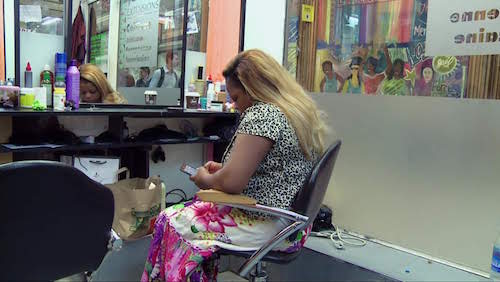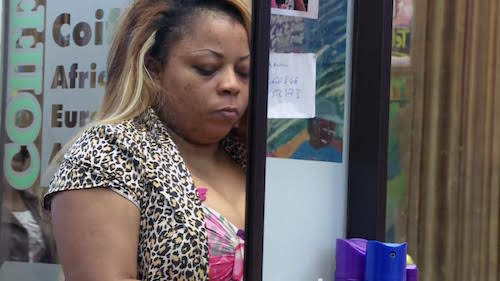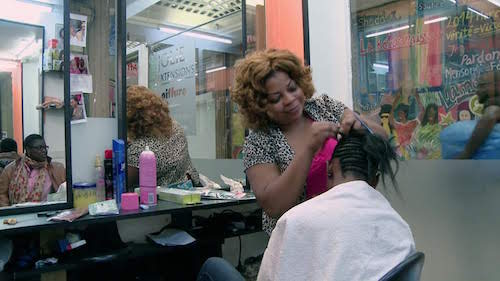Communiqué
Immigrant West African women featured on POV “Chez Jolie Coiffure” – August 3 at 10 pm
< < Back to“Chez Jolie Coiffure”
on
POV
Monday, August 3 at 10 pm
Sabine’s hands move quickly and precisely as she tightly braids hair in her tiny salon. The sign outside offers African, European, or American hairstyles. Sabine is a charismatic, larger than-life personality crammed into a tiny shop in the immigrant Brussels district of Matonge. Here, she and her employees style extensions and glue on lashes while watching soaps, dishing romantic advice, sharing rumors about government programs to legalize migrants, and talking about life back home in West Africa.

At the start of Chez Jolie Coiffure, director Rosine Mbakam, who made waves with her impressive debut film, the Icarus Films release The Two Faces of a Bamileke Woman, stands outside the salon, filming. Sabine calls her in, warning her it’s unsafe out in hallway of the cramped urban mall. Mbakam sets up in the shop—and stays, filming over the course of a year, becoming a regular fixture and presence. This cinematic “chamber piece,” which takes place entirely inside a salon not much larger than a take-out stand, makes skillful use of its many mirrors.
More than a place for women to get their hair done, Jolie Coiffure serves as a community hub for West African women—many from Cameroon, like Sabine. Fueled by endless cans of soda and cups of McDonald’s coffee, she recruits for a tontine—an investment scheme paying each member a yearly annuity, organizes accommodation for a pregnant woman who lacks immigration papers, and, in quieter, more introspective moments, tells her own harrowing journey to Belgium after working as a domestic under terrible conditions in Lebanon.

Though she has created a home in her own space, Sabine remains an outsider in Belgium. Students and tourist groups made up only of white people walk past, pausing at the window and gawking. (At one point, Sabine urges Mbakam to turn her camera on them so they’ll go away; the director obliges.) When word has it that the immigration police are coming through, she hurriedly turns off all the lights and quickly vanishes out the door.
Chez Jolie Coiffure is a highly revealing documentary, capturing the day-to-day lives and concerns of immigrant West African women in a space they can call their own.
“Critic’s Pick! Rosine Mbakam makes a remarkable debut; demonstrates a mastery of perspective, a rare ability to include the camera in community.” —The New York Times
“Intense vulnerability makes the film emotionally gripping; the contrast between a public storefront and intimate confessions makes it engrossing… Unequivocally extracts a powerful sense of empathy—and urgency.” —Vox Magazine
 “An elegant portrayal; [in Sabine’s salon,] the surrounding community is nurtured in generous and careful ways.” —H-Black Europe Journal
“An elegant portrayal; [in Sabine’s salon,] the surrounding community is nurtured in generous and careful ways.” —H-Black Europe Journal
“Meet the filmmaker reinventing how African women are portrayed in movies. [In Chez Jolie Coiffure, director Rosine Mbakam] captures the way in which this salon provides a safe space of community and support for African migrant women, while also revealing the struggles their community faces.” —National Public Radio (NPR)
“Immersive, provacative; a warm, appealing portrait. Mbakam’s portrait is knit as tightly as the braids Sabine weaves.” —Film International
“A microcosm of female entrepreneurship, community, hardship and joy.” —Crossings: Journal of Migration and Culture
“Riveting; extraordinary. A reflection on the itinerancy and multiplicity of identities, on the possibilities and limitations of placemaking. Reveals the historical wounds wrought by colonialism.” —The Black Scholar
“A must-see! Highly revealing, an atypical and timely portrait of the intersection between the immigrant experience and female identity.” —IndieWire
“An original filmmaker of exquisite sensibility; one of the foremost filmmakers of creative nonfiction working right now.” —The New Yorker

